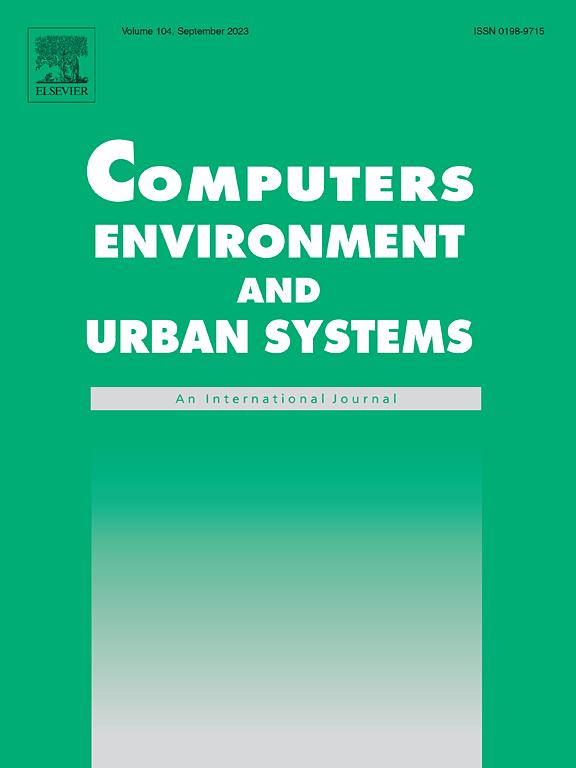实现令人满意的公共可达性:通过在线评论的众包方法来实现包容性城市设计
IF 8.3
1区 地球科学
Q1 ENVIRONMENTAL STUDIES
Computers Environment and Urban Systems
Pub Date : 2025-08-23
DOI:10.1016/j.compenvurbsys.2025.102329
引用次数: 0
摘要
随着城市人口的增长,对无障碍城市设计的需求变得迫切。评估公众对无障碍的看法的传统方法,如调查和访谈,往往是资源密集和地理范围有限的。通过在线评论的众包为理解公众的看法提供了一个有价值的选择,大型语言模型(llm)的进步可以促进它们的使用。在这项研究中,我们检查了来自美国各地兴趣点(poi)的100多万条谷歌地图评论,并使用低等级适应(LoRA)技术对Llama 3模型进行微调,以确定公众对可访问性的看法。在POI级别,大多数类别(餐馆、零售、酒店和医疗保健)表现出负面情绪,表明关键行业之间存在持续障碍。社会空间回归分析显示,白人居民比例高、社会经济优势大的地区,其积极情绪越高。相反,在老年人和高学历人口更集中的地区,负面情绪表达得更多。有趣的是,残疾的存在与公众情绪之间没有明显的联系,但残疾友好得分与公众感知之间确实存在显著的正相关关系。总体而言,我们的研究结果证明了通过法学硕士增强分析的众包在识别无障碍挑战和为包容性城市设计提供信息方面的价值,并为规划者、政策制定者和倡导者提供可操作的见解,以努力实现更公平的城市。本文章由计算机程序翻译,如有差异,请以英文原文为准。
Toward satisfactory public accessibility: A crowdsourcing approach through online reviews to inclusive urban design
As urban populations grow, the need for accessible urban design has become urgent. Traditional methods for assessing public perceptions of accessibility, such as surveys and interviews, are often resource-intensive and geographically limited in scope. Crowdsourcing via online reviews offers a valuable alternative to understanding public perceptions, and advancements in large language models (LLMs) can facilitate their use. In this study, we examine over one million Google Maps reviews from points of interests (POIs) across the United States and fine-tune the Llama 3 model using the Low-Rank Adaptation (LoRA) technique to identify public sentiment toward accessibility. At the POI level, most categories – restaurants, retail, hotels, and healthcare – show negative sentiments, indicating persistent barriers across key sectors. Socio-spatial regression analysis reveals that more positive sentiment is associated with areas that have higher proportions of white residents and greater socioeconomic advantage. Conversely, more negative sentiment is expressed in areas with higher concentrations of elderly and highly-educated populations. Interestingly, no clear link is found between the presence of disabilities and public sentiments, but a significant positive relationship does exist between disability-friendly scores and public perception. Overall, our findings demonstrate the value of crowdsourcing with LLM-enhanced analysis in identifying accessibility challenges and informing inclusive urban design, offering actionable insights for planners, policymakers, and advocates striving toward more equitable cities.
求助全文
通过发布文献求助,成功后即可免费获取论文全文。
去求助
来源期刊

Computers Environment and Urban Systems
Multiple-
CiteScore
13.30
自引率
7.40%
发文量
111
审稿时长
32 days
期刊介绍:
Computers, Environment and Urban Systemsis an interdisciplinary journal publishing cutting-edge and innovative computer-based research on environmental and urban systems, that privileges the geospatial perspective. The journal welcomes original high quality scholarship of a theoretical, applied or technological nature, and provides a stimulating presentation of perspectives, research developments, overviews of important new technologies and uses of major computational, information-based, and visualization innovations. Applied and theoretical contributions demonstrate the scope of computer-based analysis fostering a better understanding of environmental and urban systems, their spatial scope and their dynamics.
 求助内容:
求助内容: 应助结果提醒方式:
应助结果提醒方式:


